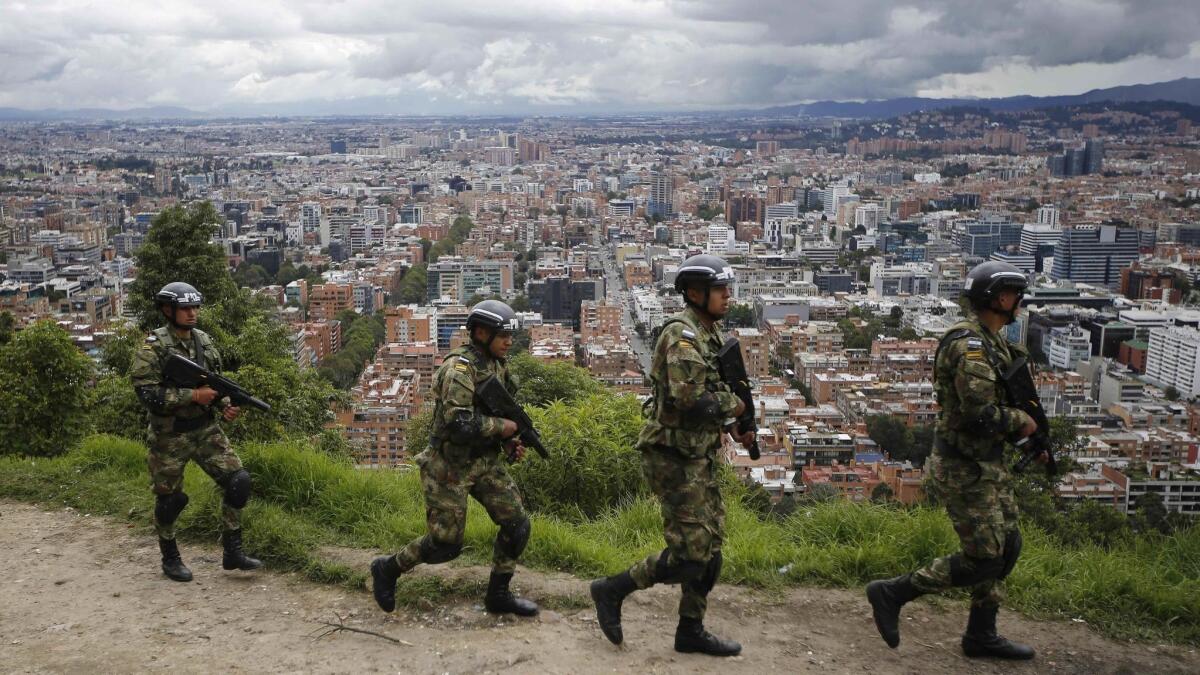Colombia’s presidential election could signal end of peace pact with former FARC rebels, analysts say

- Share via
Reporting from BOGOTA, COLOMBIA — Colombians go to the polls Sunday in a historic presidential election that could decide the fate of the already precarious peace agreement by the country’s largest and most violent rebel group and the government of outgoing president and Nobel Peace Prize laureate Juan Manuel Santos.
The election is the first in Colombia since the disarmament of the Revolutionary Armed Forces of Colombia, or FARC, under terms of the peace deal signed in November 2016 that ended 52 years of civil conflict. Depending on who wins, analysts say, the vote could presage the end of the accord, which is already on shaky ground amid assassinations of former combatants and allegations of noncompliance by both sides.
Surveys indicate that none of the five presidential candidates is strong enough to garner the 50% plus one votes needed to avoid a June runoff. Two diametrically opposed candidates are likely to proceed to the second round: right-wing politician Ivan Duque, who opposes critical elements of the peace deal, and leftist former guerrilla Gustavo Petro, who generally supports the pact.
Also running are former Medellin Mayor Sergio Fajardo; former senator and cabinet minister German Vargas Lleras, and former vice president and peace negotiator Humberto de la Calle. Although 30 million Colombians are eligible to vote, turnout of no more than 15 million is expected.
Duque, a 41-year-old economist, led his opponents in opinion polls prior to balloting with 35% of those questioned saying he would get their vote. He is favored to beat Petro, a former Bogota mayor, or any of the other candidates he would face in a runoff next month.
The front-runner status of Duque, a relatively unknown quantity in Colombian politics, is testimony to the enduring power of his patron, former President and now Sen. Alvaro Uribe. Many Colombians credit Uribe for turning the tide militarily against the FARC with $10 billion in military and anti-terrorism aid from the U.S. under so-called Plan Colombia.
Santos was awarded the Nobel Peace Prize for brokering the deal with FARC, but the pact is unpopular among many Colombians. Uribe has been a strident critic of the pact with the rebels, favoring instead a military victory, which he maintained was close at hand when he left office in 2010.
Duque, a former Inter-American Development Bank staffer and holder of a Georgetown University graduate degree, has pledged to amend the justice provisions in the accord so that FARC members convicted of heinous crimes serve prison sentences; rebel leaders have vowed never to submit to such punishment.
All other candidates have publicly pledged to support the peace process if elected.
Arlene Tickner, an international relations professor at Rosario University in Bogota, said the agreement already is in serious jeopardy because of “slow implementation, lack of money and other factors” and that changes proposed by Duque could spell its doom
“There is growing distrust of the process on the part of many demobilized guerrillas,” Tickner said. “So depending on who passes to the second round, we will see efforts to stall it even more or reinvigorate it. While I think it’s impossible to dismantle the peace deal completely, it could be dismembered to the point it ends up falling apart.”
Duque also has said he supports the extradition to the U.S. of Jesus Santrich, a former top FARC commander who was arrested in April on charges of facilitating a drug deal with a Mexican cartel. A federal court in New York has requested Santrich’s extradition.
Although the peace pact guarantees ex-rebels lenient detention sentences under special peace tribunals for crimes committed before the accord was signed, it stipulates that ex-fighters are subject to ordinary justice for crimes committed after that point.
As a result, Duque and other hard-liners say Santrich, who is accused of trafficking drugs after the deadline, should be extradited. For its part, the FARC, which has morphed into a political party using the same initials, alleges that Santrich, who was set to take a seat in Congress, was framed and that an extradition would violate the pact. Peace deal advocates argue extradition should be denied to salvage the accord.
In any case, Santrich’s arrest has fortified peace deal critics who say the FARC has not lived up to its end of the bargain by failing to provide authorities with more information on drug-trafficking routes and contacts it developed with cartels during the conflict. For that reason, the U.S. State Department still classifies the FARC political party as a terrorist entity.
“Duque is Uribe’s hand-picked candidate, a smart guy, technically competent, but with few if any identifiable independent political positions of his own,” said Bruce Bagley, a University of Miami professor. “If he is elected, make no mistake, we will have ‘Uribe 2.0’ back in office.”
Duque also has benefited from what Bagley and Tickner described as a campaign to stigmatize Petro as a “Castro-Chavista” populist candidate who would lead Colombia down a path to socialism and economic ruin as happened in neighboring Venezuela under the late President Hugo Chavez. Chavez was a political protege of Cuba’s Fidel Castro.
Petro’s left-leaning campaign has emphasized the need to address social and economic inequality in Colombia, which, with its 28% poverty rate, is one of Latin America’s most economically and socially unequal countries.
Kraul is a special correspondent.
More to Read
Sign up for Essential California
The most important California stories and recommendations in your inbox every morning.
You may occasionally receive promotional content from the Los Angeles Times.










